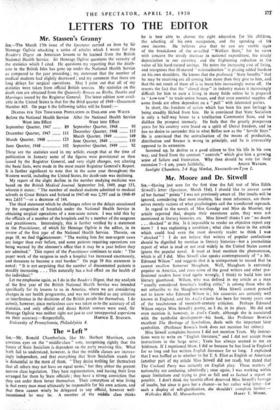The Left "
Sitt.--Mr. Ronald Chamberlain, like Mr. Herbert Morrison, casts covetous eyes on the " middle-class " vote, recognising rightly that the future of State Socialism is dependent on the party Deceiving this. What both fail to understand, however, is that the middle classes are increas- ingly independent, and that everything that State Socialism stands for is distasteful to the most of them. "They desire nothing for themselves that all others may not have on equal terms," but they abhor the present narrow class legislation. They hate regimentation, and having their lives arranged for them by State officials ; they have a strong conviction that they can order them better themselves. Their conception of wise living is that every man must ultimately be responsible for his own actions, and that these cannot wisely be delegated to any official, however well- intentioned he may be. A member of the middle class thinks he is best able to choose the right education for his children. the selecting of his own occupation, and the spending of his own income. He believes also that he can see visible signs of the breakdown of the so-called " Welfare State," for he views with concern the steady increase in national expenditure, the steady depreciation in our currency and the frightening reduction in the value of his hard-earned savings. He notes the increasing cost of living, and recognises that ill-starred " nationalisation " is placing added burdens on his own shoulders. He knows that the professed " State benefits " tha; he may be receiving are all costing him more than they give to him, and that the net result-of them all is to leave him increasingly worse off. He resents the fact that the " closed shop " in industry makes it increasingly difficult for him to earn a living in many fields unless he is prepared to " kow-tow " to trade-union bosses, and that even essential supplies of some foods are often dependent on a " pull" with interested parties.
In short, the. freedom of action which has been his past heritage is being steadily filched from him. He is convinced that State Socialism is only a half-way house to a totalitarian Communist State, and he dislikes the prospect intensely. He feels that the greatly prosperous years for his country were based on a spirit of liberal freedom, and he has no desire to surrender this to what Belloc saw as the " Servile State." He is convinced that the centralisation of the means of production, distribution and finance is wrong in principle, and he is irrevocably opposed to its extension.
Summed up, he desires as a good citizen to live his life in his own way, and freed from the constant " controls" which give him a growing sense of failure and frustration. Why then should he vote for their










































 Previous page
Previous page